As appeal showdown looms, Carter denies VA's request to halt housing construction
The 9th U.S. Circuit Court of Appeals is likely to stay the judge's order compelling the VA to develop temporary housing.
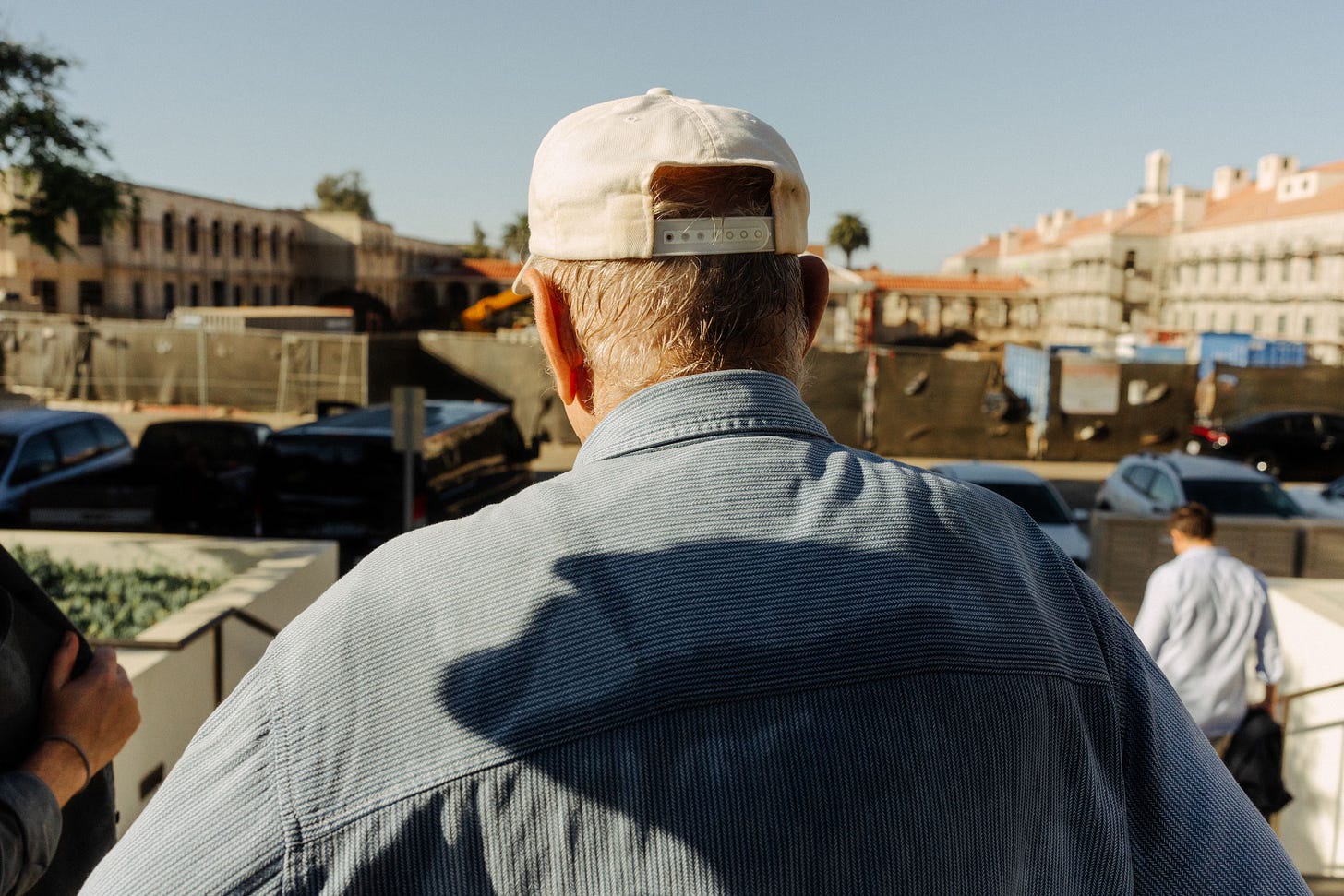
On Wednesday, U.S. District Judge David O. Carter turned down the Department of Justice’s request for a stay, while the government appeals his order for the VA to provide thousands of permanent and temporary homes on the agency’s West LA campus.
The government’s stay request now goes back to the 9th U.S. Circuit Court of Appeals, which is considered likely to keep it in place. On Friday, the appeals court put a freeze on injunctive relief that Carter had issued earlier in the case, including an emergency order authorizing work on 100 temporary modular units that the judge and consultants for veterans had been racing to complete before Feb. 1.
Veterans attorneys said they would ask the higher court to rule on the emergency housing quickly. The government’s broader appeal of Judge Carter’s ruling in favor of the veterans in the class action lawsuit could take months or years to resolve.
Long Lead has been reporting from Powers v. McDonough every day court has been in session, and we will continue to follow this issue in this newsletter. Subscribe here to get updates sent direct to your inbox as soon as they publish:
In his decision Wednesday, Carter accused the VA of mismanaging the campus, which was deeded as a home for disabled soldiers after the Civil War, and emphasized the need for urgency in bringing severely disabled veterans off the street and into decent housing.
“Despite decades of mismanagement of the West LA VA campus, failed promises, missed deadlines, and VA ignoring prior court decisions, federal defendants seek to stall plaintiffs’ progress and this court’s findings,” Carter wrote. “This has resulted in veterans sleeping and dying on the streets of Los Angeles.”
VA attorney Cody Knapp argued that Carter’s orders upended the VA’s own plans to end veteran homelessness.
The appeal “does not mean the VA is leaving veterans to die in the streets,” Knapp said. “The VA is redoubling its efforts and we’ve made great progress.”
“The government says we’re going to put up more units on these grounds,” veterans’ attorney Mark Rosenbaum of Public Counsel said. “The difference is, your Honor says, ‘Now.’”
Veterans’ experts estimated the price tag for the modular units at $15 million; the VA put the cost at $30 million. “You can find that in the government’s couches,” Rosenbaum scoffed.
Now Screening: Watch “The Promised Land” at The Veterans Film Festival
Long Lead is proud to announce that “The Promised Land” is an official selection for The Veterans Film Festival. The 25-minute film provides an unflinching look at LA’s homeless veteran crisis, letting unhoused heroes give a street-level view of what life is like when your government leaves you behind.
The documentary short is part of Home of the Brave and was directed by Bronze Star Army veteran and documentary filmmaker Rebecca Murga.
The Veterans Film Festival is Nov. 14–15 from 10 a.m to 5 p.m. at Bob Hope Patriotic Hall in LA. The event is free. For more information, click here.
In November 2022, veterans sued the VA over its failure to house homeless veterans, including many with serious mental and physical disabilities. More than 3,000 veterans currently live on the streets in Los Angeles County.
Under previous litigation, the VA had leased parts of the 388-acre property to a third-party private development consortium to build 1,200 units of permanent supportive housing, but a decade later only 307 units have opened.
Carter ruled against the VA in September, ordering production of thousands of additional units of temporary and permanent campus housing. Carter also struck down long term land leases the VA had negotiated, and in some cases extended, for UCLA’s baseball field, the private Brentwood School’s athletic facilities and an oil drilling operation, among others.
Knapp argued that the Rehabilitation Act, which disabled veterans relied on to demand more housing, did not apply, and asserted that the VA had no “enforceable fiduciary duty” to dip into its budget for housing. He also said that the campus has enough vacant units to house homeless veterans temporarily.
Mark Rosenbaum said there has been no progress for the more than 3,000 unhoused veterans in Los Angeles County. Plaintiffs had asked over and over for an accounting of how many homeless veterans were dying in the street but “nobody from the government knew, nobody had inquired,” said Rosenbaum.
He said the campus vacancies were in treatment facilities not housing, and attributed empty beds to the VA’s lack of outreach workers, which he said totaled 13 for the entire southern California region. Rosenbaum also said the government is ignoring the severity of the homeless disabled veterans’ condition.
“Is there any greater emergency in America today?” Rosenbaum said. Veterans are only homeless because they “served their country,” he said.
“You cannot state you are committed to ending veteran homelessness and put a halt to the court’s orders that would move people into homes now,” Rosenbaum said.
Forty years of veterans protesting the West LA VA
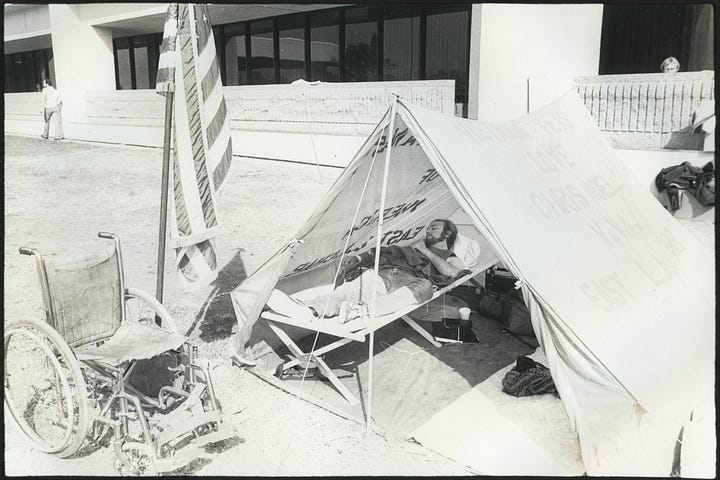
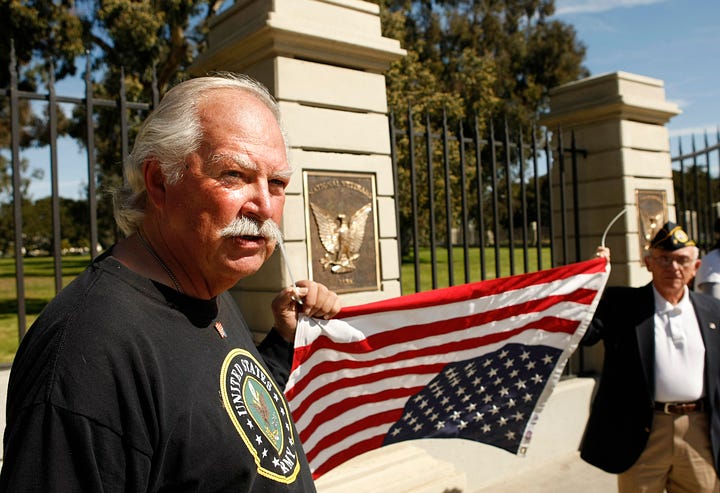
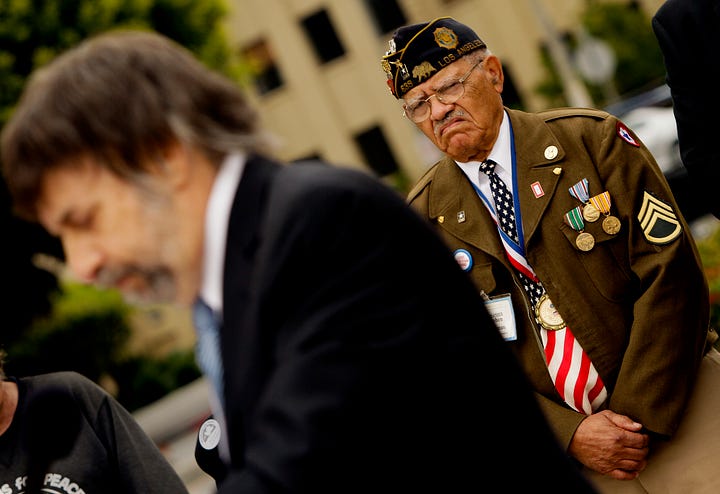
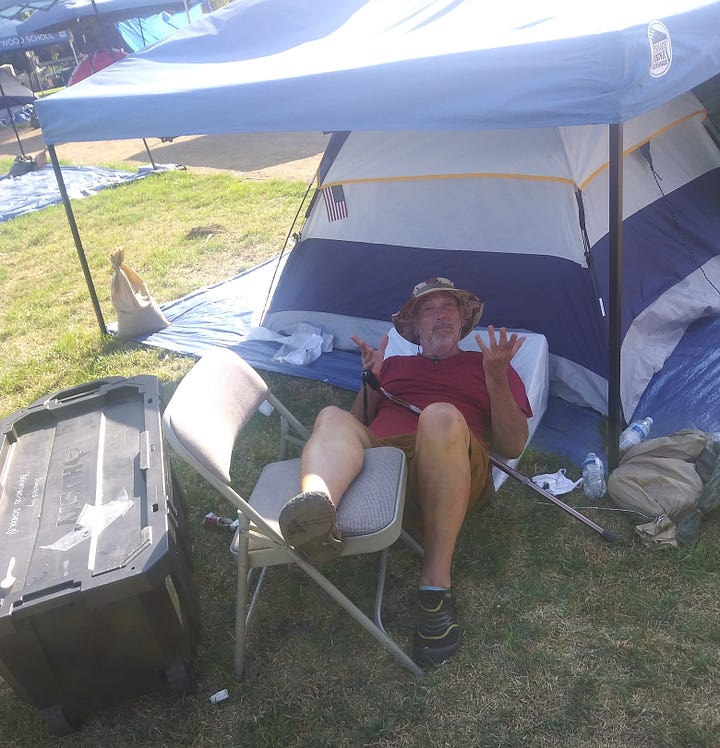
Protests and lawsuits over housing and conditions at the West LA VA have been going on for more than 40 years. The latest developments in Powers v. McDonough indicate that the battle isn’t over. Learn more about the history of this property by reading Home of the Brave.
The government is also appealing Carter’s order barring the VA from renegotiating the voided leases he voided in his ruling. Under the judge’s supervision, Brentwood School had reached a $5 million preliminary settlement that would allow veterans use of its pool, track, and weight room more than half the time. Carter had locked UCLA out of its baseball facilities but relented after the university doubled its annual rent to $600,000.
Carter, in his ruling, suggested the government had cut underhanded deals with the VA that greatly undervalued the land. Rosenbaum said allowing the VA to take back control of leasing would send a bad message.
“The implication is that they just ripped off veterans for prime real estate and they can do that with impunity,” the attorney said.
Don Garza, an Army veteran who has been monitoring the court proceedings, said the VA was stalling on fulfilling its duty to veterans. “They have spent so much money not to care for veterans,” Garza said.
“The government has a duty to be a good landlord,” said veteran Robert Canas, who predicted the outcome of the case could affect VA land leases nationwide.
Powers v. McDonough will continue at the 9th U.S. Circuit Court of Appeals.







